人教版英语八年级上册《Unit7WillpeoplehaverobotsSectionA(1a—2d)》同步测试题
人教版英语八年级上册Unit 7《Will people have robots》教学设计
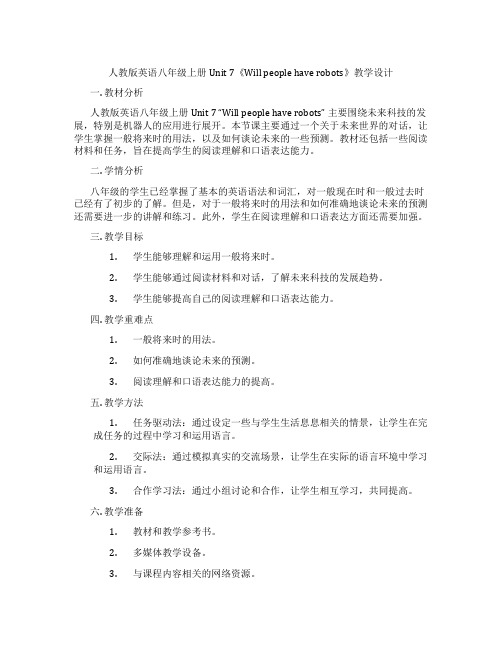
人教版英语八年级上册Unit 7《Will people have robots》教学设计一. 教材分析人教版英语八年级上册Unit 7 “Will people have robots” 主要围绕未来科技的发展,特别是机器人的应用进行展开。
本节课主要通过一个关于未来世界的对话,让学生掌握一般将来时的用法,以及如何谈论未来的一些预测。
教材还包括一些阅读材料和任务,旨在提高学生的阅读理解和口语表达能力。
二. 学情分析八年级的学生已经掌握了基本的英语语法和词汇,对一般现在时和一般过去时已经有了初步的了解。
但是,对于一般将来时的用法和如何准确地谈论未来的预测还需要进一步的讲解和练习。
此外,学生在阅读理解和口语表达方面还需要加强。
三. 教学目标1.学生能够理解和运用一般将来时。
2.学生能够通过阅读材料和对话,了解未来科技的发展趋势。
3.学生能够提高自己的阅读理解和口语表达能力。
四. 教学重难点1.一般将来时的用法。
2.如何准确地谈论未来的预测。
3.阅读理解和口语表达能力的提高。
五. 教学方法1.任务驱动法:通过设定一些与学生生活息息相关的情景,让学生在完成任务的过程中学习和运用语言。
2.交际法:通过模拟真实的交流场景,让学生在实际的语言环境中学习和运用语言。
3.合作学习法:通过小组讨论和合作,让学生相互学习,共同提高。
六. 教学准备1.教材和教学参考书。
2.多媒体教学设备。
3.与课程内容相关的网络资源。
七. 教学过程1.导入(5分钟)通过向学生展示一些机器人的图片,引起学生的兴趣,然后提问:“你们认为未来的人们会拥有机器人吗?”,让学生发表自己的看法。
2.呈现(10分钟)老师通过讲解和示范,向学生介绍一般将来时的用法,并举例说明如何准确地谈论未来的预测。
3.操练(10分钟)学生分组进行角色扮演,模拟真实的交流场景,运用一般将来时进行对话。
老师对学生的表现进行指导和评价。
4.巩固(10分钟)学生阅读教材中的阅读材料,理解并回答相关问题。
人教新目标八年级上册Unit 7 Will people have robots?Unit 7 Se
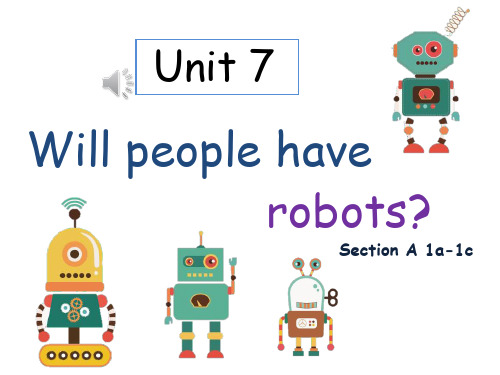
Ask and answer
A:_W_i_ll_ people _h_av_e_robots in their homes in 100 years? B:Yes, __th_e_y_ __wi_ll__.
Ask and answer
A:_W_i_ll_ _th_e_re_ __b_e _only one country in the future? B:No, _t_he_r_e _ _w_o_n’__t .
Exercising
根据句意及所给首字母提示,补全句中所缺单词。
Many fish in the river died because of water p_o_l_lu_t_i_o_n____.
Exercising
根据句意及所给首字母提示,补全句中所缺单词。
Who knows what will happen in the f_u_t_u_r_e_?
paper
pollution pollute
future 2117 年
How will the world be different 100 years from
1a now? Read these predictions. Check ( √ ) A ( for
agree) or D ( for disagree).
Will there be less pollution
in the future? [‘fjuː tʃə(r)]
[pə 'luː ʃ(ə)n]
n.将来;未来
----Yes, there will. ----No, there won’t.
pollute v.污染
[pə 'luː t]
(新人教版)八年级上_unit7_Will_people_have_robots

2c Make conversations about the predictions in 2a and 2b.
A: What’s your prediction about the future?
B: I think there will be more pollution. A: Really? I don’t think so. But I think
Will books only be on computers, not on paper?
Will every home have a car?
Will there only be one country?
Will people live to be 200 years old?
Will students go to school or study at home on computers?
比较级
many (Biblioteka 饰可数名词) more更多的 much (修饰不可数名词) (most 最多的)
little 一些的(否定)
less更少的 (修饰不可数名词)(least最少的) water, air, paper, time, pollution, money, coffee
few 一些的(否定) fewer更少的(修饰可数名词)(fewest最少的)
2.人们100年后将会使用钱吗?不,不会。每件东西都是 免费的。 Will people use money in 100 years? No, they won’t. Everything will be free.
人教版英语八年级上册Unit7Willpeoplehaverobots
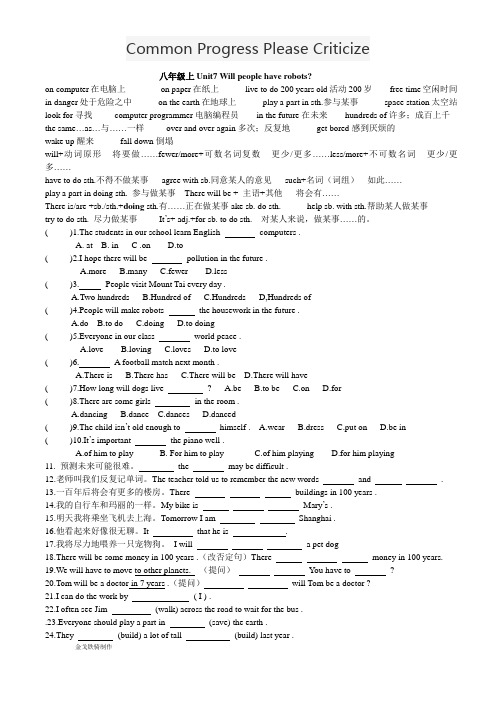
八年级上Unit7 Will people have robots?on computer在电脑上on paper在纸上live to do 200 years old活动200岁free time空闲时间in danger处于危险之中on the earth在地球上play a part in sth.参与某事space station太空站look for寻找computer programmer电脑编程员in the future在未来hundreds of许多;成百上千the same…as…与……一样over and over again多次;反复地get bored感到厌烦的wake up醒来fall down倒塌will+动词原形将要做……fewer/more+可数名词复数更少/更多……less/more+不可数名词更少/更多……have to do sth.不得不做某事agree with sb.同意某人的意见such+名词(词组)如此……play a part in doing sth. 参与做某事There will be + 主语+其他将会有……There is/are +sb./sth.+doing sth.有……正在做某事ake sb. do sth. help sb. with sth.帮助某人做某事try to do sth. 尽力做某事It’s+ adj.+for sb. to do sth. 对某人来说,做某事……的。
( )1.The students in our school learn English computers .A. atB. in C .on D.to( )2.I hope there will be pollution in the future .A.moreB.manyC.fewerD.less( )3. People visit Mount Tai every day .A.Two hundredsB.Hundred ofC.Hundreds D,Hundreds of( )4.People will make robots the housework in the future .A.doB.to doC.doingD.to doing( )5.Everyone in our class world peace .A.loveB.lovingC.lovesD.to love( )6. A football match next month .A.There isB.There hasC.There will beD.There will have( )7.How long will dogs live ? A.be B.to be C.on D.for( )8.There are some girls in the room .A.dancingB.danceC.dancesD.danced( )9.The child isn’t old enough to himself . A.wear B.dress C.put on D.be in( )10.It’s important the piano well .A.of him to playB. For him to playC.of him playingD.for him playing11. 预测未来可能很难。
人教版英语八年级上册全册教材全解:人教版英语八年级上册 Unit 7 Will people hav
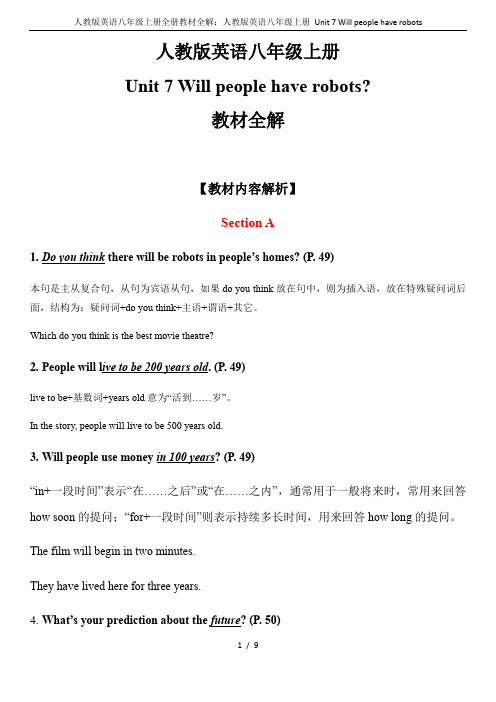
人教版英语八年级上册Unit 7 Will people have robots?教材全解【教材内容解析】Section A1.Do you think there will be robots in people’s homes? (P. 49)本句是主从复合句,从句为宾语从句,如果do you think放在句中,则为插入语,放在特殊疑问词后面,结构为:疑问词+do you think+主语+谓语+其它。
Which do you think is the best movie theatre?2.People will l ive to be 200 years old. (P. 49)live to be+基数词+years old意为“活到……岁”。
In the story, people will live to be 500 years old.3.Will people use money in 100 years? (P. 49)“in+一段时间”表示“在……之后”或“在……之内”,通常用于一般将来时,常用来回答how soon的提问;“for+一段时间”则表示持续多长时间,用来回答how long的提问。
The film will begin in two minutes.They have lived here for three years.4.What’s your prediction about the future?(P. 50)future作名词,表示“将来、未来”,in the future表示“在将来”。
Who knows what will happen in the future.5.I don’t think so.(P. 50)I don’t think so表示“我不这么认为”,肯定形式为I think so。
---Look at the cloud. It is going to rain.---I don’t think so. It will be sunny soon.【拓展】类似的结构还有:I hope so“我希望如此”,I hope not“我希望不是这样”,I’m afraid so“恐怕如此”,I’m afraid not“恐怕不是这样的”。
初中英语人教版八年级上册《Unit7 Will people have robots Section

3c
Complete the chart and discuss it with your partner.
A: What do you want to be when you grow up? B: I want to be a reporter. A: How are you going to do that? B: I’m going to write articles and send them to
可数名词 1. more +
不可数名词
2. less + 不可数名词
3. fewer + 可数名词
more songs 更多的歌曲
more juice 更多的果汁
less news 更少的消息
fewer actors 更少的演员
People will have less free time.
人们将会有更少的闲暇时间。
1) be going to 表示近期、眼下就要产生的事情, will 表示的将来时间则较远一些。 He is going to write a letter tonight. He will write a book one day.
2) be going to 表示根据主观判定将来肯定产生的 事情,will表示客观上将来势必产生的事情。 He is seriously ill. He is going to die. He will be twenty years old.
tomorrow?
A.does; like
B.is; liking
C.will; like
D.will; be like
4. Don't ___A_____ water, or we will have no clean water
人教版2020年八年级英语上册Unit7Willpeoplehaverobots讲义(新版)人教新目标版

Unit 7 Will people have robots? (讲义) Words and expressionspaper /'peɪpə(r)/ n. 纸;纸张pollution /pə'luːʃn/ n. 污染;污染物prediction /prɪ'dɪkʃn/ n. 预言;预测future /'fjuːtʃə(r)/ n. 将来;未来pollute /pə'luːt/ v. 污染environment /ɪn'vaɪrənmənt/ n.环境planet/'plænɪt/ n. 行星earth /ɜː(r)θ/n. 地球;世界plant /plɑːnt/ v. 种植n. 植物part /pɑː(r)t/ n. 参加;参与;部分play a part 参与(某事)peace /piːs/ n. 和平sea /siː/ n. 海;海洋sky /skaɪ/ n. 天空astronaut /'æstrənɔːt/ n. 宇航员;航天员apartment /ə'pɑː(r)tmənt/ n. 公寓套房rocket /'rɒkɪt/ n. 火箭space /speɪs/ n. 太空;空间space station 太空站;宇宙空间站human /'hjuːmən/ adj. 人的n. 人servant /'sɜː(r)vənt/ n. 仆人dangerous /'deɪndʒərəs/ adj. 有危险的;不安全的already /ɔːl'redi/ adv.已经;早已factory /'fæktəri/ n. 工厂over and over again 多次;反复地believe /bɪ'liːv/ v.相信;认为有可能disagree /,dɪsə'griː/ v.不同意;持不同意见;有分歧even /'iːvn/ adv.甚至;连;愈加hundreds of 许多;大量shape /ʃeɪp/ n. 形状;外形fall /fɔːl/ v. (fell /fel/) 倒塌;跌倒;掉落fall down 突然倒下;跌倒;倒塌inside /ɪn'saɪd/ adv. & prep. 在……里面look for 寻找;寻求possible /'pɒsəbl/ adj. 可能存在或发生的;可能的impossible /ɪm'pɒsəbl/ adj. 不可能存在或发生的;不可能的side /saɪd/ n. 一方(的意见、态度、立场)probably /'prɒbəbli/ adv.很可能;大概during /'djʊərɪŋ/ prep. 在……期间holiday /'hɒlədeɪ/ n. 假期;假日word /wɜː(r)d/ n. 单词;词Nick /nɪk/ 尼克(男名)James /dʒeɪmz/ 詹姆斯(男名)White /waɪt/ 怀特(姓)Role-playNick: What are you reading, Jill?Jill: It’s a book about the future.Nick: Sounds cool. So what will the future be like?Jill: Well, cities will be more crowded and polluted. There will be fewer trees and the environment will be in great danger. Nick: That sounds bad! Will we have to move to other planets? Jill: Maybe. But I want to live on the earth.Nick: Me, too. Then what can we do?Jill: We can use less water and plant more trees. Everyone should play a part in saving the earth.Grammar focus’ll=willwon’t=will not3a Fill in the blanks with more, less or fewer.1.In the future, there will be fresh water because there will bepollution in the sea.2.In 100 years, there will be cars because there will bepeople in the cities.3.There will be jobs for people because robotswill do the same jobs as people.4.I think there will be cities because people will buildbuildings in the country.5.In 50 years, people will have free time because therewill be things to do.Reading2b Read the article and match each paragraph with the questionsit discusses.Paragraph 1 Will robots think like humans in thefuture? Paragraph 2 What will robots be like in the future? Paragraph 3 What can robots do today?Paragraph 4 What are robots like in movies?Do You Think You Will Have Your Own Robot?1.When we watch movies about the future, we sometimes see robots. Theyare usually like human servants. They help with the housework and do jobs like working in dirty or dangerous places.2.Today there are already robots working in factories. Some can helpto build cars, and they do simple jobs over and over again. Fewer people will do such jobs in the future because they are boring, but robots will never get bored.3.Scientists are now trying to make robots look like humans and dothe same things as we do. Some robots in Japan can walk and dance.They are fun to watch. However, some scientists believe that although we can make robots move like people, it will be difficult to make them really think like a human. For example, scientist James White thinks that robots will never be able to wake up and know where they are. But many scientists disagree with Mr. White. They think that robots will even be able to talk like humans in 25 to 50 years.4.Some scientists believe that there will be more robots in the future.However, they agree it may take hundreds of years. These new robots will have many different shapes. Some will looks like humans, and others might look like animals. In India, for example, scientists made robots that look like snakes. If buildings fall down with people inside, these snake robots can help look for people under thebuildings. This was not possible 20 years ago, but computers and rockets also seemed impossible 100 years ago. We never know what will happen in the future!Exercises一、填空1.Our (环境) will be better if we protect it.2.The (预言) didn’t come true.3.His uncle is an (宇航员).4.He worked in a (太空站) last year.5.There are five (仆人) in his family.6.Tom was surprised by all the (pollute) on the beach.7.We hope the world will be (peace).8.Be away from the tiger. It’s(danger).9.It’s too late. I (agree) that we go there today.10.It seems (possible) that people can fly.二、单选( )11. Please pass me two .A.pieces of paperB. pieces of papersC. pieces paperD. piece papers( )12. Let’s play a part the room.A. cleanB. cleaningC. to cleanD. in cleaning( )13. volunteers will give out leaflets(传单) to ask people to protect the wetlands(湿地).A. Two hundredsB. Hundreds ofC. Two hundred ofD. Hundred of( )14. , Tom! It’s time to get up and go to school.A. Wake upB. Make upC. Grow upD. Look up ()15. John will go to France on vacation this summer.A. possibleB. impossibleC. probablyD. probable( )16. It is difficult for a robot _ thesame things aperson does.A. doing; likeB. do; fromC. to do; asD. does; as( )17. —What are you doing in the room?—I’m my hat.A. looking afterB. looking forC. looking upD. looking like( )18. There are some students the classroom.A. cleanB. to cleaningC. cleaningD. cleans( )19. There are many clouds _ the sky.A. inB. onC. atD. to( )20. I think the movie is interesting. But he disagrees me.A. inB. withC. toD. of( )21. It’s7 p.m., but the children are not backyet.A. alsoB. eitherC. alreadyD. only( )22. If there are people driving, there will be _air pollution.A. less; lessB. less; fewerC. fewer; fewerD. fewer;less( )23. —Willthere be schools in the future?—I think students will study at home on the Internet.A. Yes, there will.B. No, there won’t.C. Yes, there is.D. No, there isn’t.三、翻译24.你同意将来会有更多的污染吗?Do you that there will be more pollution?25.你能告诉我未来是什么样子吗?Can you tell me what the ? 26.你必须反复地练习才能做得很好。
人教版英语八年级上册Unit7《Will people have robots_》知识点
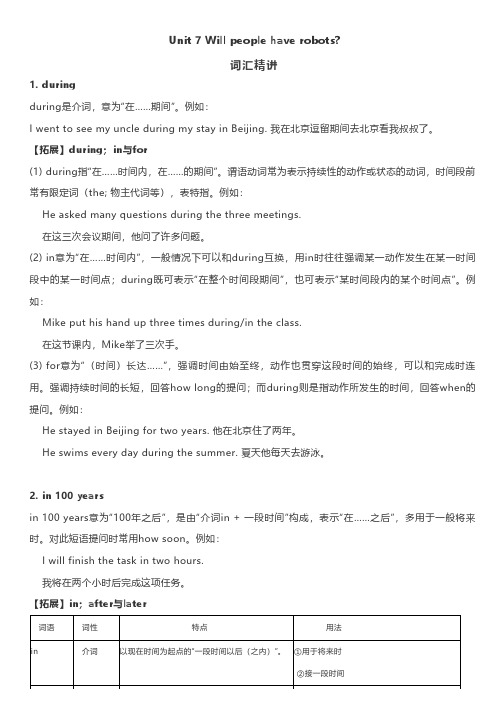
Unit 7 Will people have robots?词汇精讲1. duringduring是介词,意为“在……期间”。
例如:I went to see my uncle during my stay in Beijing. 我在北京逗留期间去北京看我叔叔了。
【拓展】during;in与for(1) during指“在……时间内,在……的期间”。
谓语动词常为表示持续性的动作或状态的动词,时间段前常有限定词(the; 物主代词等),表特指。
例如:He asked many questions during the three meetings.在这三次会议期间,他问了许多问题。
(2) in意为“在……时间内”,一般情况下可以和during互换,用in时往往强调某一动作发生在某一时间段中的某一时间点;during既可表示“在整个时间段期间”,也可表示“某时间段内的某个时间点”。
例如:Mike put his hand up three times during/in the class.在这节课内,Mike举了三次手。
(3) for意为“(时间)长达……”,强调时间由始至终,动作也贯穿这段时间的始终,可以和完成时连用。
强调持续时间的长短,回答how long的提问;而during则是指动作所发生的时间,回答when的提问。
例如:He stayed in Beijing for two years. 他在北京住了两年。
He swims every day during the summer. 夏天他每天去游泳。
2. in 100 yearsin 100 years意为“100年之后”,是由“介词in + 一段时间”构成,表示“在……之后”,多用于一般将来时。
对此短语提问时常用how soon。
例如:I will finish the task in two hours.我将在两个小时后完成这项任务。
人教新目标八年级上册英语《Unit 7 Will people have robots?》Secti
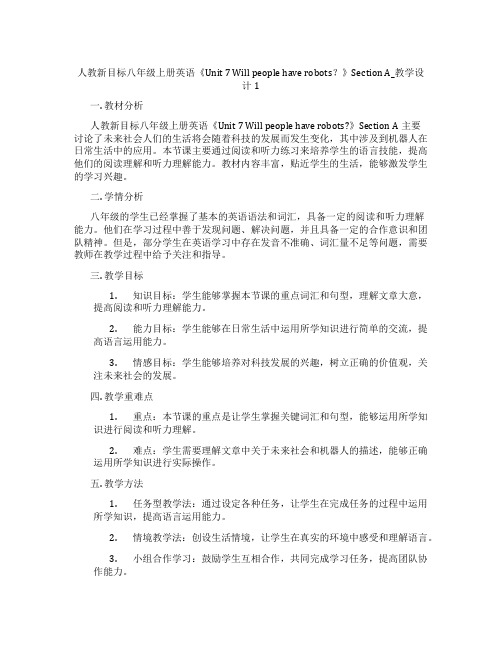
人教新目标八年级上册英语《Unit 7 Will people have robots?》Section A_教学设计1一. 教材分析人教新目标八年级上册英语《Unit 7 Will people have robots?》Section A主要讨论了未来社会人们的生活将会随着科技的发展而发生变化,其中涉及到机器人在日常生活中的应用。
本节课主要通过阅读和听力练习来培养学生的语言技能,提高他们的阅读理解和听力理解能力。
教材内容丰富,贴近学生的生活,能够激发学生的学习兴趣。
二. 学情分析八年级的学生已经掌握了基本的英语语法和词汇,具备一定的阅读和听力理解能力。
他们在学习过程中善于发现问题、解决问题,并且具备一定的合作意识和团队精神。
但是,部分学生在英语学习中存在发音不准确、词汇量不足等问题,需要教师在教学过程中给予关注和指导。
三. 教学目标1.知识目标:学生能够掌握本节课的重点词汇和句型,理解文章大意,提高阅读和听力理解能力。
2.能力目标:学生能够在日常生活中运用所学知识进行简单的交流,提高语言运用能力。
3.情感目标:学生能够培养对科技发展的兴趣,树立正确的价值观,关注未来社会的发展。
四. 教学重难点1.重点:本节课的重点是让学生掌握关键词汇和句型,能够运用所学知识进行阅读和听力理解。
2.难点:学生需要理解文章中关于未来社会和机器人的描述,能够正确运用所学知识进行实际操作。
五. 教学方法1.任务型教学法:通过设定各种任务,让学生在完成任务的过程中运用所学知识,提高语言运用能力。
2.情境教学法:创设生活情境,让学生在真实的环境中感受和理解语言。
3.小组合作学习:鼓励学生互相合作,共同完成学习任务,提高团队协作能力。
六. 教学准备1.教师准备:备好相关教学资料,如PPT、教学视频等。
2.学生准备:预习本节课的单词和句型,提前了解相关背景知识。
七. 教学过程1.导入(5分钟)教师通过向学生展示一些机器人图片,引导学生谈论机器人,激发学生的学习兴趣。
八年级英语上册 Unit 7 Will people have robots?(第2课时)说课稿

八年级英语上册 Unit 7 Will people have robots?(第2课时)说课稿一. 教材分析《八年级英语上册》Unit 7 “Will people have robots?” 是人教版新目标英语教材的一个单元。
本单元主要围绕未来科技的发展,特别是机器人在日常生活中的应用进行讲解。
通过本单元的学习,学生可以掌握一般将来时的被动语态,提高自己的听说读写能力,并激发他们对未来科技的想象和思考。
二. 学情分析八年级的学生已经掌握了英语学习的基本语法和词汇,具备一定的听说读写能力。
他们对新科技充满好奇,善于接受新鲜事物,但同时也可能对一些抽象的概念和语言表达感到困惑。
因此,在教学过程中,我们需要关注学生的个体差异,因材施教,激发他们的学习兴趣和积极性。
三. 说教学目标根据《义务教育英语课程标准》和教材内容,本节课的教学目标如下:1.知识目标:学生能够掌握一般将来时的被动语态,理解与未来科技相关的词汇和表达。
2.能力目标:学生能够在真实情境中运用所学知识进行交流,提高听说读写能力。
3.情感目标:激发学生对未来的想象和思考,培养他们对科技发展的积极态度。
四. 说教学重难点1.教学重点:学生能够熟练运用一般将来时的被动语态进行表达。
2.教学难点:学生能够准确理解与未来科技相关的词汇和表达,以及在真实情境中运用所学知识进行交流。
五. 说教学方法与手段本节课采用任务型教学法,结合情境教学法和分组合作学习法,利用多媒体教学手段,激发学生的学习兴趣,提高他们的参与度和积极性。
六. 说教学过程1.导入:通过展示一段关于未来科技的短片,引发学生对未来的想象,激发他们的学习兴趣。
2.呈现:教师通过PPT展示本节课的主要内容,引导学生关注一般将来时的被动语态和与未来科技相关的词汇。
3.操练:学生分组进行角色扮演,运用所学知识进行对话,教师给予指导和反馈。
4.巩固:学生完成一组有关未来科技的练习题,检测他们对知识的掌握程度。
英语人教版八年级上册Unit-7Will-people-have-robots
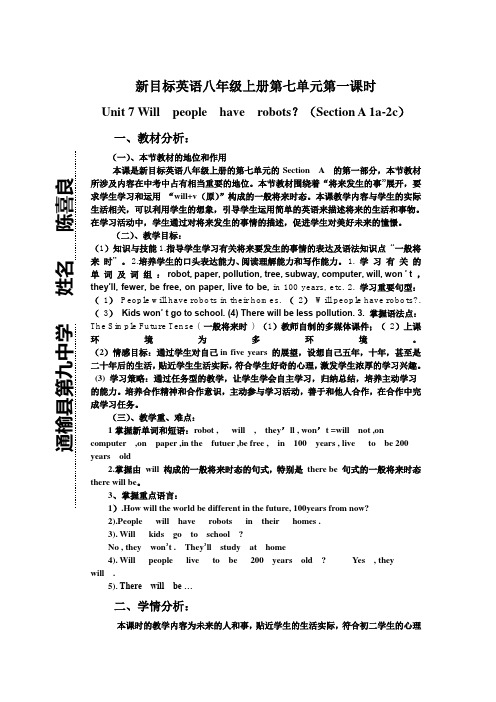
Unit 7 Will people have robots?(Section A 1a-2c)一、教材分析:(一)、本节教材的地位和作用本课是新目标英语八年级上册的第七单元的Section A 的第一部分,本节教材所涉及内容在中考中占有相当重要的地位。
本节教材围绕着“将来发生的事”展开,要求学生学习和运用“will+v(原)”构成的一般将来时态。
本课教学内容与学生的实际生活相关,可以利用学生的想象,引导学生运用简单的英语来描述将来的生活和事物。
在学习活动中,学生通过对将来发生的事情的描述,促进学生对美好未来的憧憬。
(二)、教学目标:(1)知识与技能1.指导学生学习有关将来要发生的事情的表达及语法知识点“一般将来时” 。
2.培养学生的口头表达能力、阅读理解能力和写作能力。
1. 学习有关的单词及词组:robot, paper, pollution, tree, subway, computer, will, won ’ t ,they’ll, fewer, be free, on paper, live to be, in 100 years, etc. 2. 学习重要句型:(1)People will have robots in their homes. (2)Will people have robots?. (3)Kids won’ t go to school. (4) There will be less pollution. 3. 掌握语法点:The Simple Future Tense ( 一般将来时) (1)教师自制的多媒体课件;(2)上课环境为多环境。
(2)情感目标:通过学生对自己in five years 的展望,设想自己五年,十年,甚至是二十年后的生活,贴近学生生活实际,符合学生好奇的心理,激发学生浓厚的学习兴趣。
(3) 学习策略:通过任务型的教学,让学生学会自主学习,归纳总结,培养主动学习的能力。
英语人教版八年级上册Unit-7-Will-people-have-robots
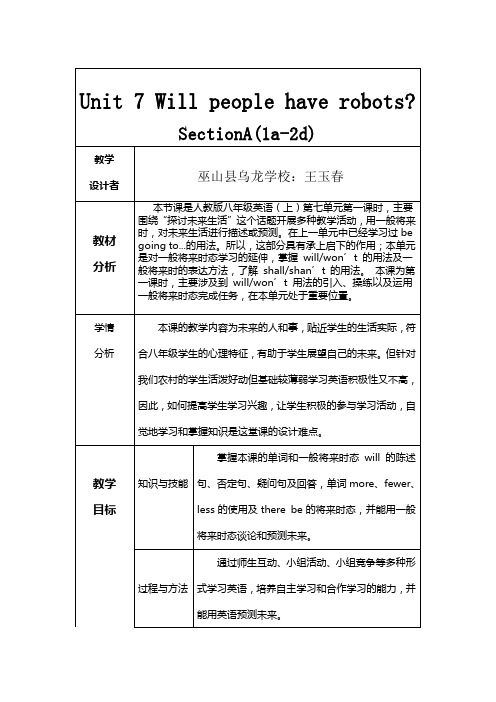
Yes,…will./No,…won’t.
There will/won’t be( more/fewer/less)…
小组评价
教
学
后
记
该教学设计非常贴近学生的生活实际,条理清晰。在引入和课程进行中充分考虑到学生对英语学习感兴趣不浓,运用了许多更直观,更引人入胜的设计,让学生在游戏中巩固新知识,激发学生的学习兴趣使学生乐于学习、乐于探究。在教学过程的设计中充分体现了老师引导,学生自主学习和合作探究学习的观点。设计过程详细但又不受书本内容的局限,把听力归纳在一起来,让学生集中练习。在教学活动中通过预测地球进行德育教育的渗透,增强环保意识。在重点语法教学方面,采用给出实例,让学生归纳总结的方法,不仅教给学生本课的重要语法,同样也交给学生自学的有效方法。
过程与方法
通过师生互动、小组活动、小组竞争等多种形式学习英语,培养自主学习和合作学习的能力,并
能用英语预测未来。
情感态度与价值观
培养合作意识和集体荣誉感,增强环保意识。
教学重点
学习will一般将来时态的构成方式。
单词more、fewer、less的用法,能熟练运用一般将来时态
预测未来。
教学难点
用will一般将来时态表达未来。
Step7.Exercise and homework.
设计理念:复习巩固本堂课所学的知识。
板
书
设
计
Unit 7 Will people have robots? --- Section A
一般将来时:will
1.肯定句:主+will +V(原形)+其他.
2.否定句:主+won’t +V(原形)+其他.
初中英语人教版八年级上册《Unit7 Will people have robots Section

Section B (2a-2e)
人教新目标版 八年级上
1
What you know about robots? What do they look like and what can they do?
What does the robot look like? shape
do the same things as we do
look like humans
walk, dance difficult, think like a human
more robots
different shapes
2c 1. Robots can build __c_a_rsin factories. 2. They can do __s_im__p_l_e jobs many times and
can. For example, he thinks that robots will ________be able to wake
upneavnedrknow where they are. Which side do you________ with? agree
1. human 人
【辨析】 human,person与people
human
Human servants.
They can do simple jobs over and over again.
Guess! What can snake robots do?
If buildings _f_a_ll_d_o_w__n with people _i_n_s_id_e, these snake robots can help ___lo__o_k_f_orpeople under the buildings.
人教版英语八年级上册 Unit 7 Will people have robots教材全解
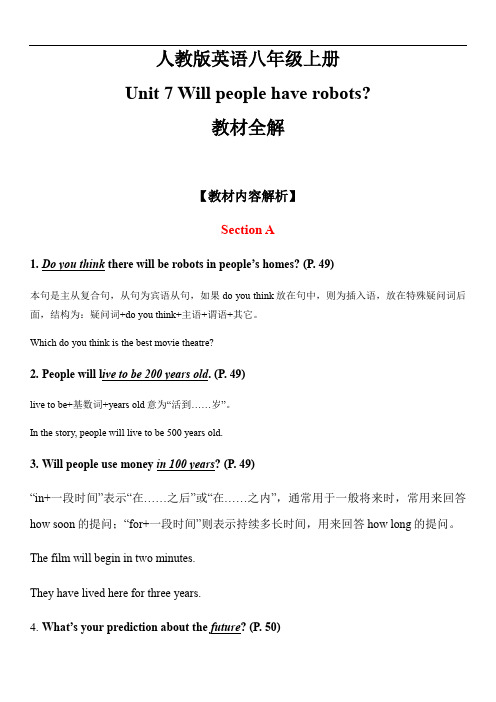
人教版英语八年级上册Unit 7 Will people have robots?教材全解【教材内容解析】Section A1.Do you think there will be robots in people’s homes? (P. 49)本句是主从复合句,从句为宾语从句,如果do you think放在句中,则为插入语,放在特殊疑问词后面,结构为:疑问词+do you think+主语+谓语+其它。
Which do you think is the best movie theatre?2.People will l ive to be 200 years old. (P. 49)live to be+基数词+years old意为“活到……岁”。
In the story, people will live to be 500 years old.3.Will people use money in 100 years? (P. 49)“in+一段时间”表示“在……之后”或“在……之内”,通常用于一般将来时,常用来回答how soon的提问;“for+一段时间”则表示持续多长时间,用来回答how long的提问。
The film will begin in two minutes.They have lived here for three years.4.What’s your prediction about the future?(P. 50)future作名词,表示“将来、未来”,in the future表示“在将来”。
Who knows what will happen in the future.5.I don’t think so.(P. 50)I don’t think so表示“我不这么认为”,肯定形式为I think so。
---Look at the cloud. It is going to rain.---I don’t think so. It will be sunny soon.【拓展】类似的结构还有:I hope so“我希望如此”,I hope not“我希望不是这样”,I’m afraid so“恐怕如此”,I’m afraid not“恐怕不是这样的”。
人教版英语八 年级上册Unit 7 Will people have robots Section

Unit7 Will people have robots?SectionB 1a-1e教师寄语:Where there is a will, there is a way. 有志者事竟成。
一、Learning aims (学习目标):1、Students can read the four wordsastronaut 、apartment 、 rocket 、 space station2 、Students can make predictions using “will”3、Students learn to talk about their past 、now and future学习重点:Students make discussion about their past 、now and future 学习难点:writing practice using the target language二、学法指导:Cooperating三、Studying steps:Step1.Enjoy a song—I have a dreamStep2.Brainstorm (Let’s compete!)How many dream jobs and transportation and places to live do you know? Make a listDream jobs:Transportation:Places to live:Step3.Present picturesStep4.Do 1aStep5.PairworkA:What will you be when you grow up?B:I’ll be a(an)......A:How will you go to work?B:I’ll go......A:Where will you live?B:I’ll live......Step6.Listening practiceFirst,(1c) Listen to Alexis and Joe. Number the pictures [1-3].Next,(1d) Listen again. Fill in the blanks with the correct verbs in the box.Step7.Talk ShowNow interview(采访) everyone’s life now,five years ago and five years from now in your groups.Name Now five years ago In five yearsInterviewer(采访者):......A:......B: ......C: ......... ... ...Step8. WritingAccording to the above results. I think you can do some writing,then report like this:In my group, Zhang Wei was a...and he played soccer and he had ...five years ago.But now he is a...四、Self—check(自我检测)单项选择1.In ten years, John_______ an astronaut.A. isB. will beC. wasD. will2.Mary_______computer science last year.A. studiedB. studiesC. will study3. What_______the world be like in 50 years?A. isB. willC. wasD. are五、Blackboard Design1、key wordsAstronaut rocket apartment space station2、key pointsPlayed ---- play --- will play六、Homework想像一下20年之前的郑州、看看现在的郑州,再设想一下20年之后的郑州,然后小组讨论并写一篇80字左右的文章。
人教版英语八年级上册Unit 7 Will people have robots_
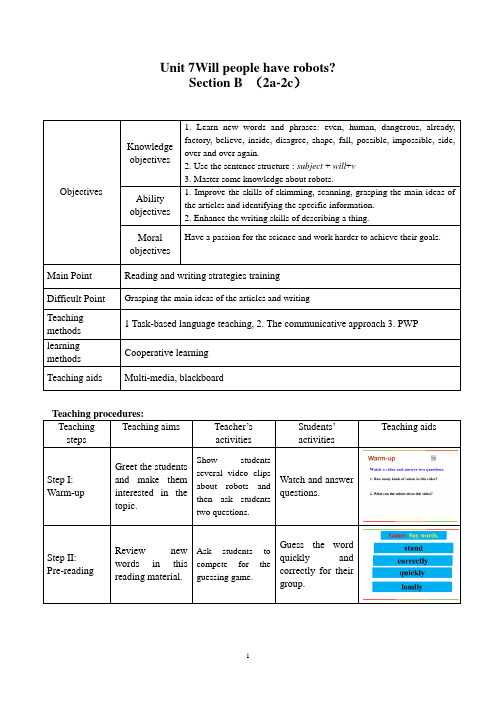
Unit 7Will people have robots?Section B (2a-2c)Objectives Knowledgeobjectives1. Learn new words and phrases: even, human, dangerous, already,factory, believe, inside, disagree, shape, fall, possible, impossible, side,over and over again.2. Use the sentence structure : subject + will+v3. Master some knowledge about robots.Abilityobjectives1. Improve the skills of skimming, scanning, grasping the main ideas ofthe articles and identifying the specific information.2. Enhance the writing skills of describing a thing.MoralobjectivesHave a passion for the science and work harder to achieve their goals.Main Point Reading and writing strategies trainingDifficult Point Grasping the main ideas of the articles and writingTeachingmethods1 Task-based language teaching, 2. The communicative approach 3. PWP learningmethodsCooperative learningTeaching aids Multi-media, blackboardTeaching procedures:Teaching steps Teaching aims Teacher’sactivitiesStudents’activitiesTeaching aidsStep I: Warm-up Greet the studentsand make theminterested in thetopic.Show studentsseveral video clipsabout robots andthen ask studentstwo questions.Watch and answerquestions.Step II: Pre-reading Review newwords in thisreading material.Ask students tocompete for theguessing game.Guess the wordquickly andcorrectly for theirgroup.Train students’reading skill —prediction Ask students tolook at the title andthe picture, andpredict what theywill read next.Look at the titleand the pictureand guess whatthe materialmainly talks aboutStep III: While-reading Train students’reading skill—grasping the mainidea.Ask students tofind key wordsand topic sentenceof each paragraphas well as thewhole passage.Find the topicsentence and keywords.Train students’reading skill—identifying thespecificinformation.Ask students tofind the details inthe passage.Read eachparagraph quicklyand get thedetails.Step IV: Post-reading Train students totransform thegiven informationinto their ownwords.Ask students tofill in the blanks.Filling the blanksaccording to thepassageCultivatestudents’abilityof cooperativelearning.Let students workin a group anddesign their ownrobots. T is readyto give help ifneeded.Cooperate anddiscuss in class todesign their ownrobots.Improve students’writing andspeaking.Invite severalpresenters toshow their robots.Design, draw andwrite andescription oftheir own robots.Step V: Summary Consolidatestudents’understandingand encouragethem to studyharder to changeour way of life.Evaluate students’performance andencourage them tostudy harder tocreate a betterworld.Review thematerial and lookforward to a newfuture.Step VI: Homework Consolidate thenewly learnedknowledge in thereading materialGive them somehomework.Finish thehomework afterclass.Blackboard design。
八年级英语上册《Unit7Willpeoplehaverobots》的知识点归纳
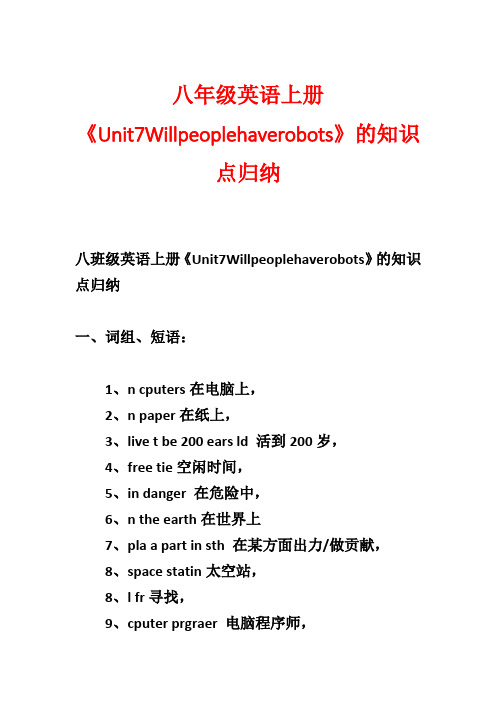
八年级英语上册《Unit7Willpeoplehaverobots》的知识点归纳八班级英语上册《Unit7Willpeoplehaverobots》的知识点归纳一、词组、短语:1、n cputers在电脑上,2、n paper在纸上,3、live t be 200 ears ld 活到200岁,4、free tie空闲时间,5、in danger 在危险中,6、n the earth在世界上7、pla a part in sth 在某方面出力/做贡献,8、space statin太空站,8、l fr寻找,9、cputer prgraer 电脑程序师,10、in the future 在将来,11、hundreds f成百上千的.,12、the sae…as与…一样,13、ver and ver again 反复,14、get bred 无聊,abe/perhaps 用于句首。
Mabe/Perhaps u are right.1. during / fr / in 介词,在……期间。
说到某事是在某一段时间之间发生的用during; 说到某事持续多久则用fr; 说到某事具体发生的时间用in.We visited an places f interest during the suer hlida.I’ve been here fr tw we es.The usuall leave schl in ul.一般将来时结构:肯定式:主语+ will/shall + 动词原形+ 其他will 用于各种人称,shall 用于第一人称。
主语+ be ging t + 动词原形+ 其他be 随人称、数和时间的变化而变换。
否定式:在will/shall/be 后面加nt. will nt = wn’t .一般疑问句:将will/shall/be 提到主语前面。
There be 句型的一般将来时:There will be + 主语+ 其他,意为:将会有。
人教版初中八年级英语上册七单元will_people_have_robots
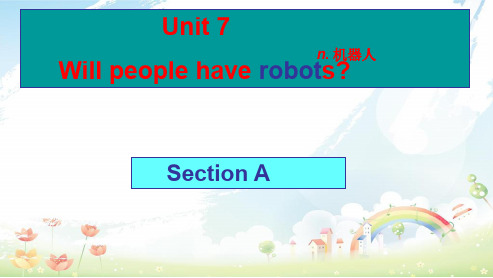
一般将来时 The Simple Future Tense
定义:表示计划、打算做某事 结构: 1. 主语+be + v.-ing
常用于趋向性动词,如:go, come, leave, arrive, drive, fly, return, move等,也可用于其他动词。
我们打算在下周一动身前往上海。 We are leaving for Shanghai next Monday.
一般将来时 The Simple Future Tense
表示:将会有….
There is/are going to be + n. There will be + n. 放学后将会有一场足球比赛。 There will be a football match after school.
What will the world be like in 100 years?
1c PAIRWORK
Ask and answer questions about the
predictions in activity 1a.
A: Will people use money in 100 years?
一百年后
B: No, they won’t. Everything will be free. Will people
Grammar Focus Will there be less pollution? No, there won’t. There will be more pollution. Will there be fewer trees? Yes, there will. Kids won’t go to school. Kids will study at home on computers. 一般将来时结构: 肯定式:主语 + will + 动词原形 否定式:主语 + won’t + 动词原形 一般疑问句:Will + 主语 + 动词原形
- 1、下载文档前请自行甄别文档内容的完整性,平台不提供额外的编辑、内容补充、找答案等附加服务。
- 2、"仅部分预览"的文档,不可在线预览部分如存在完整性等问题,可反馈申请退款(可完整预览的文档不适用该条件!)。
- 3、如文档侵犯您的权益,请联系客服反馈,我们会尽快为您处理(人工客服工作时间:9:00-18:30)。
一.
根据首字母及汉语提示写出句中所缺单词.
1.What do you want to be in the f.
2.Would you please give me some p ?I want to write a letter.
3.People will have r in their homes.They can help do many things.
4.If there are more trees, there will be less (污染).
5.—Are you ready?
--Yes, (每件事情)is OK.Let’s begin.
6.I don’t know the books on the table are(免费的)
二。
根据句意用所给词的适当形式填空。
1.Maybe his (predict) can come true one day.
2.There will be (little)clean water in 10 years.
3.Many animals are in great (dangerous).
4.I want to play a part in (clean)our city.
5.Do you think peoplewill live (be)200 years old.
三.选择填空
()1.There a football game tomorrow afternoon.
A.will be
B.is going to have
C.has
D.will have
( ) 2.The students will study home computers.
A.at at
B.at in
C.on at
D.at on
( ) 3.She will be a teacher two months.
A.on
B.after
C.in
D.at
( ) 4.We won’t use money,because everything will be.
A.expensive
B.cheap
C.busy
D.free
( )5.Now there are trees and pollution on the earth.
A.more,more
B.less less
C.fewer,fewer
D.fewer,more
四.根据汉语提示完成句子。
1.这儿的空气中含有大量的污染物。
There’s in the air here
2.电脑在我们公司中起着重要的作用。
第一课时Section A(1a—2d)
二.根据首字母及汉语提示写出句中所缺单词.
1. future
2.paper
3.robots
4.population
5.Everything
6.free
二。
根据句意用所给词的适当形式填空。
1.prediction
2.less
3.danger
4. cleaning
5.to be
三.选择填空
1-5 ADCDD
四.根据汉语提示完成句子。
1. a lot of pollution
2.play role
3.is all free future
4.in great danger
5.live to be。
